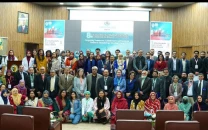Conversations about Cannibalism
Professor Laurence Goldman, author, Anthropology of Cannibalism, discusses cannibalism and some common misconceptions.

Conversations about Cannibalism
Is cannibalism something that has existed throughout the ages?
“Most of the cultures in the world understand cannibalism as something foreign, as something that has a negative connotation. If you read any academic books on the subjects, some books say there is sufficient evidence that people used to eat certain parts of their enemies, like their livers, because they thought it infused them with greater energy... but evidence is actually extremely thin on the ground.”
“What compels people to resort to cannibalism?
“I can only comment on the cultural aspects of cannibalism – I can’t comment on the acts of individual people who ate human flesh, these are people who are regarded as deviant, have complex personalities and indulge in what is known as sexual cannibalism. We don’t very often find these kinds of deviances, strangely enough, in non-western, non-developed countries though. There needn’t be any one rationale behind why people eat the flesh of other people. One explanation is survival cannibalism, where people resort to eating humans to survive. Then there is the kind of cannibalism where tribes used to eat the flesh of their enemies, perhaps to obtain their power, or it is simple a way of showing power over an individual, as if to say: ‘I can eat you.’”
Can you comment on cannibalism in history?
“Cannibalism in the Aztec civilization is written about a lot but all of the evidence and literature we have is from a colonial perspective. And the problem with colonialism is that it tends to demonise the other. When we read these texts, we have to understand where people are coming from... but I have to say that the idea of cannibalism has occurred to every single culture in the world.”
Can you comment on the Kuro disease that afflicted people in Papua New Guinea, and was said to have been caused by cannibalism?
“Evidence of cannibalism in terms of the Kuru Complex is not sound - the Kuru complex was actually discovered in Papua New Guinea. A researcher said that Kuru, which is a strain of Mad Cow disease, was actually caused by cannibalism because people were eating the brains of other infected persons, but the evidence in that case was shown to be suspect, the individual who undertook that research was later indicted on child molestation charges which called into question his work, and was said to be the reason why he was in New Guinea in the first place.”
Published in The Express Tribune, Sunday Magazine, April 24th, 2011.



















COMMENTS
Comments are moderated and generally will be posted if they are on-topic and not abusive.
For more information, please see our Comments FAQ